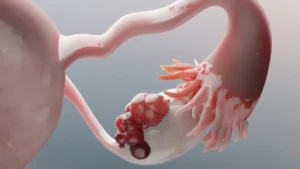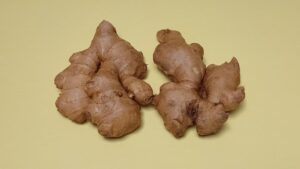The solution to the first problem arrived in the early 2010s, when researchers in the Netherlands developed a completely new way to study living systems: organoids.
“Organoids are microscopic, three-dimensional models for studying how cells self-organise into tissues,” says Chris. They’re created from specialised cells called stem cells. When these cells divide, one of the resulting ‘daughter’ cells remains a stem cell, but the other can change into different kinds of cells in the body. In doing so, stem cells help the body grow, and repair damaged tissues. And research has shown that rogue stem cells are particularly important in cancer, fuelling a tumour’s growth by endlessly churning out new cancer cells.
The Netherlands researchers had isolated stem cells from gut tissue and found a way to encourage them to form microscopic gut-like structures, made of just a few thousand cells, that recreated many of the cellular structures found in a healthy bowel. Crucially, they also showed how stem cells from patients’ bowel tumours could be grown into miniature bowel cancers.
When he first heard about organoids, Chris was intrigued by their potential for studying cell communication in cancer. “Organoids are much cheaper and easier to work with than animal models like mice. Working out how to study them at scale would be a powerful way to run thousands of experiments on cells from dozens of patient’s tumours,” Chris says.
At around the same time, tragically, Chris’ mentor – world-renowned cancer researcher Professor Chris Marshall – developed incurable bowel cancer himself. “My grandmother died of bowel cancer when I was a teenager, so seeing a scientific legend like Chris experience a similar fate really brought bowel cancer to the forefront for me” says Chris. “At the time no one really understood the tumour microenvironment in bowel cancer, but it was clear that it was very important, and I couldn’t stop thinking about it.”
Alongside organoids, another technological revolution was emerging, allowing scientists to study individual cancer cells one at a time. “It’s been an absolute game-changer for cancer research,” says Chris. “Tumours are ecosystems of millions of interacting cells and now we have the technologies to see what every cell is doing.”
Central to Chris’ work is a powerful machine known as a CyTOF, which allows organoids to be broken down and analysed one cell at a time. This means researchers can grow multiple different samples of identical organoids under different conditions, then use the CyTOF to measure how each condition changes how organoids behave, including changes in multiple different signalling molecules inside their cells. Crucially, it allows them to do this at a scale and speed that would be impossible using animal models.
This scale becomes even more powerful when applied to organoids grown from different patients’ tumours. And because no two patients have identical tumours, this has allowed Chris’s team to start to decipher the underlying rules that govern how bowel cancers respond to treatment.









